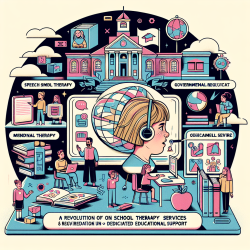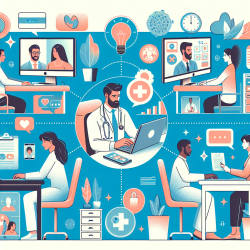In an ever-evolving educational landscape, the integration of online therapy services within schools is not merely a convenience; it is a necessity. As government health regulators, your role in fostering this transformation is crucial. This blog delves into the profound impact that online therapy services can have on school-based care, particularly in the realm of speech therapy, and why your endorsement can catalyze a significant shift towards more inclusive and effective educational support.
The Current Landscape of School-Based Therapy
Traditionally, schools have relied on in-person therapy sessions to address the diverse needs of their students. However, logistical challenges such as therapist shortages, geographical barriers, and budget constraints often hinder the consistent delivery of these essential services. This is where online therapy services, like those provided by TinyEYE, come into play.
The Advantages of Online Therapy Services
Online therapy services offer a myriad of benefits that address the shortcomings of traditional in-person therapy:
- Accessibility: Online platforms eliminate geographical barriers, ensuring that students in remote or underserved areas receive the support they need.
- Flexibility: Scheduling becomes more adaptable, accommodating the varying timetables of both students and therapists.
- Cost-Effectiveness: Reducing travel and administrative costs allows for a more efficient allocation of resources.
- Consistency: Online therapy ensures that students receive uninterrupted care, even in cases of therapist shortages or other disruptions.
Speech Therapy in Schools: A Case Study
Speech therapy is a critical component of many students' educational plans. Traditional models often struggle to provide consistent and specialized support. Online speech therapy services can bridge this gap effectively. For instance, TinyEYE's online speech therapy program has demonstrated significant improvements in student outcomes through tailored, one-on-one sessions conducted in a virtual environment.
The Role of Government Health Regulators
Your role as government health regulators is pivotal in endorsing and integrating online therapy services within the educational system. By recognizing the efficacy and benefits of these services, you can help create policies that facilitate their adoption and implementation. This includes:
- Policy Development: Establishing guidelines that recognize and support the use of online therapy services in schools.
- Funding Allocation: Directing resources towards the integration of these services to ensure they are accessible to all students.
- Quality Assurance: Implementing standards to maintain the quality and effectiveness of online therapy services.
Looking Towards the Future
The potential for online therapy services to revolutionize school-based care is immense. By embracing this change, we can ensure that all students receive the support they need to thrive academically, socially, and emotionally. As government health regulators, your advocacy and policy-making can inspire a new era of educational support that is inclusive, efficient, and effective.
In conclusion, the integration of online therapy services within schools represents a significant step forward in addressing the diverse needs of students. By endorsing and facilitating this change, government health regulators can play a crucial role in shaping a future where every student has access to the care they need, regardless of their circumstances.










